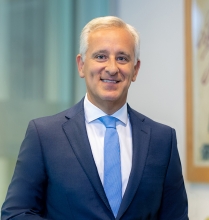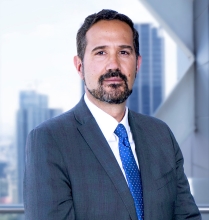International Arbitration Newsletter - February 2021 | Regional Overview: Middle East and Africa
The most relevant updates from Middle East and Africa from the global International Arbitration and ADR practice group at Garrigues.
GHANA
Beijing-based construction company sues Ghana
Everyway Traffic and Lighting Tech Co Ltd (Everyway) recently filed an ad-hoc arbitration against Ghana under the China-Ghana BIT seeking US$ 55 million in the context of an engineering, procurement, installation and construction contract for the design and construction of Accra’s automated traffic management system. This agreement includes the installation of cameras and an automatic number plate recognition program to help in the prosecution of traffic violations.
Although the contract was signed and approved by Ghanaian authorities and Everyway started to perform its obligations under it, the Chinese investor first alleged that it received no payment from the African country and that, at the end of last year, the government revoked the approval, substituting it with a new approved contract with two other Chinese investors.
Everyway now alleges that Ghana has failed to offer a fair and equitable treatment and has illegally expropriated its investment in the project. For its part, the Ghanaian government justified the change of contractor by alleging that the background checks conducted on Everyway had called the investor’s reputation into question, even suggesting Everyway had little overseas experience and scarce manpower to carry out the project.
This is one of the few claims brought by Chinese investors against African States, even though Chinese investment in Africa has soared in the past decade (from US$ 75 million in 2008 to US$ 2.7 billion in 2019), actually surpassing US foreign investments in the continent.
Ghana is found liable for cancellation of an energy project
A London-seated UNCITRAL tribunal has ordered Ghana to pay around US$ 170 million to Ghana Power Generation Company (GPGC) for cancelling an agreement that was signed in the midst of an electricity supply crisis as GPGC had validly terminated the contract in light of the State’s “repudiatory conduct” In addition, Ghana’s counterclaim for breach of contract was dismissed.
Whilst the country suffered a supply shortage, the parties signed an emergency power purchase agreement compelling GPGC to bring two gas turbine power plants to Ghana from Italy, which would offer a continued supply of electricity to the whole of Ghana for four years. However, two years after the signature, a newly elected government raised concerns about the “substantial excess” of energy supply that the emergency agreement could have. As a result, the newly elected Ghanaian government decided to terminate the agreement alleging that the company had failed to fulfil its obligations.
GPGC launched its UNCITRAL claim requesting more than US$ 134 million for the unlawful termination. In its counterclaim, Ghana contended that it was owed an early termination payment and sought additional damages for breach of contract.
The tribunal found that a government review committee had sealed the agreement’s fate once it had concluded that Ghana could save a substantial amount of money by terminating the contract. Thus, the tribunal agreed with the claimant that the State’s “sole reason” for terminating the agreement was that it was more expensive to honour it. GPGC argued that Ghana had made a decision purely on “a cost-benefit analysis” that had been then disguised with a “coating of legal veneer”.
QATAR
UAE prevails in an ICJ claim over Qatar embargo
In a recent majority decision, the International Court of Justice (ICJ) in the Hague rejected a claim brought by Qatar against the UAE over the latter´s alleged human rights violations arising from a discriminatory embargo used to single out Qatari nationals that would contravene the 1965 International Convention on the Elimination of All Forms of Racial Discrimination (CERD).
Qatar brought the ICJ proceedings in the summer of 2018 after several Gulf States, led by the UAE, broke diplomatic and trade relationships with Qatar and imposed travel bans against its citizens. The justification given for those measures was the apparent ties existing between Qatar and different regional terrorist groups, which the accused State still denies
Before the ICJ Qatar contended that the measures deliberately targeted Qatari nationals only on the basis of their nationality. However, in this judgement, the court held that the prohibition against discrimination based on “national origin” does not encompass current nationality and that, therefore, CERD does not apply to discriminatory treatment based on current nationality. Supporting this conclusion, the court cited paragraph two of article 1 of CERD, which provides that any “distinctions, exclusions, restrictions, or preferences” between citizens and non-citizens fall outside CERD’s scope. For the Court, such a differentiation between citizens and non-citizens shows that CERD does not prevent countries from adopting measures that make distinctions between their own current nationals and current Qatari nationals.
The anti-Qatari measures have led to a myriad of claims brought by the blockaded State before the ICJ, the PCA, the Council of the International Civil Aviation Organization and against other Gulf States under their respective BITs.
At a summit held at the beginning of 2021, diplomatic ties have been restored and travel bans have been lifted.
NIGERIA
Shell files for ICSID arbitration against Nigeria
Shell and its subsidiary the Shell Petroleum Development Company of Nigeria (SPDC) have filed an investment arbitration administered by ICSID under the Dutch-Nigerian BIT over an oil mining joint venture in the Niger Delta that has led to multiple lawsuits regarding alleged environmental contamination.
SPDC owns an oil-extracting lease in the Niger Delta where it has gas plants, more than 1,000 wells and produces nearly 40% of Nigeria’s oil. In 2011,the UN published a report accusing both Shell and Nigeria for polluting the Niger Delta to such an extent that the clean-up would cost more than US$ 1 billion and would take over 30 years. This report has spearheaded a series of local claims against Shell before Nigerian courts. Indeed, some sources say that SPDC was ordered to pay damages that would now amount to US$ 350 million but that the subsidiary denied all responsibility and has refused to pay, pursuing multiple appeals. In 2015, Shell decided to compensate landowners in the area with up to US$ 55 million.
In a recent communication, SPDC blamed the oil spillage on criminal acts such as sabotage, theft and illegal refining.
Contacts



-
+52 55 1102 3570
-
+52 81 8153 3900
-
+52 442 296 6400
-
+57 601 326 69 99


